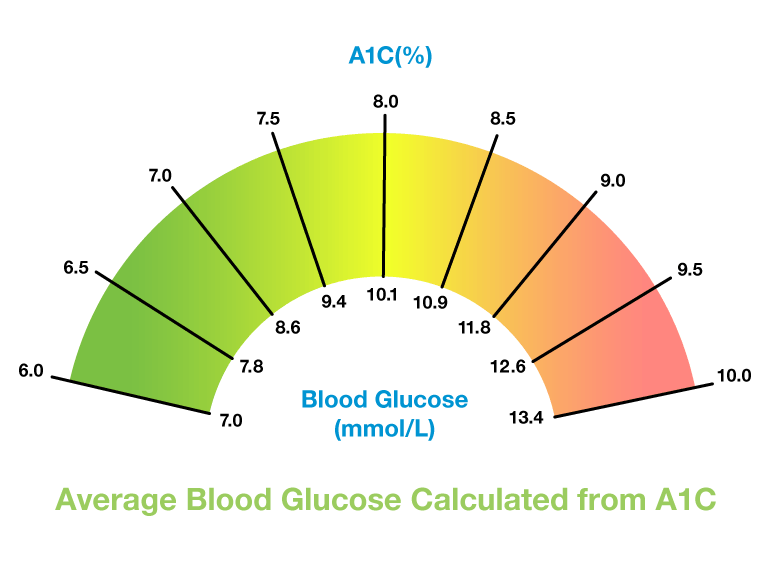
What is an A1C test?
Hemoglobin A1C (short for ‘glycated hemoglobin’) test is a measure of your blood glucose levels over the past three months. To do a hemoglobin A1C test, your healthcare team takes a sample of your blood, which is then sent to a laboratory. The laboratory then analyzes the blood sample and determines your A1C level. These A1C results are sent to your healthcare team, who then share them with you.
How does the A1C test work?
The hemoglobin A1C test is based on the attachment of glucose to hemoglobin, which is the protein in red blood cells that carries oxygen. In the body, red blood cells are constantly forming and dying, but they live for about three months. Thus, the test reflects the average of a person’s blood glucose levels over the past three months. The A1C test result is reported as a percentage.
What is my A1C target?
According to Diabetes Canada clinical practice guidelines, the A1C target for most people with diabetes is 7.0% or lower.
How often should I have an A1C test?
Diabetes Canada recommends that people with diabetes should have a hemoglobin A1C test every six months, if their blood glucose levels are within target ranges. If blood glucose targets are not currently being met, or people are making changes to your diabetes management (for example, starting a new diabetes drug), they should have an A1C test every three months.
Why is A1C important?
A1C test results give you a good idea of how well your diabetes treatment plan is working. For example, if your A1C is higher than 7.0%, that means your blood glucose levels have also been higher than normal. If this is the case, you and your healthcare team can talk about ways to lower your blood sugar levels and, hence, your A1C. This might be achieved through diet, exercise and medication adjustments.
What can blood sugar affect your A1C level?
Your A1C levels are inextricably linked to your blood glucose levels. So, the things that cause your blood sugar levels to rise will have the same effect on your A1C. These include eating less healthy foods, not getting enough exercise and not taking your diabetes medications as prescribed.
Recording your A1C level:
It’s important to keep a record of your blood glucose levels, so that you can see how your diabetes management plan is working over the course of your diabetes journey. There are logbooks available where you can write down your A1C and your blood glucose levels at regular intervals. There are also apps and online tools that can help you record your results quickly and easily.
For more information about A1C, and what it means for your overall diabetes management, click here.
How does the A1C relate to blood glucose levels?
The A1C test result can be correlated to the average of levels taken through traditional self-monitoring of blood glucose. The estimated average glucose is determined from a number of directly measured blood glucose levels over time. The chart above shows how to translate the A1C into an average blood glucose level.
What can affect your A1C level?
Your A1C levels are inextricably linked to your blood glucose levels. So, the things that cause your blood sugar levels to rise will have the same effect on your A1C. These include eating less healthy foods, not getting enough exercise and not taking your diabetes medications as prescribed.
Recording your A1C level
It’s important to keep a record of your blood glucose levels, so that you can see how your diabetes management plan is working over the course of your diabetes journey. There are logbooks available where you can write down your A1C and your blood glucose levels at regular intervals. There are also apps and online tools that can help you record your results quickly and easily.
For more information about A1C, and what it means for your overall diabetes management, click here.

